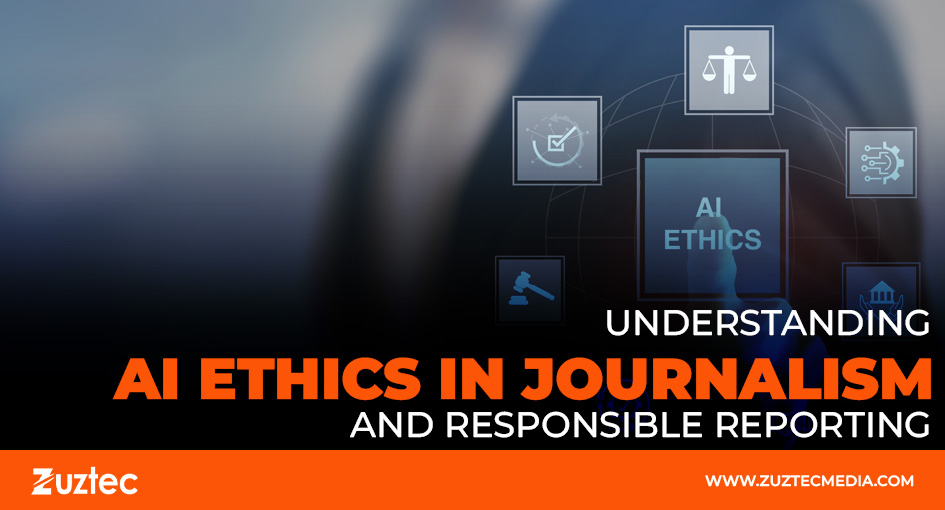
Understanding AI Ethics in Journalism and Responsible Reporting
Artificial intelligence (AI) is changing how journalism works. From writing headlines to analyzing large data sets, AI tools are now part of many newsrooms. These tools can help journalists work faster and cover more ground. But along with these benefits come serious ethical concerns. When AI is used to write or help shape the news, we must ask, can we trust the information? Who is responsible if something goes wrong? And how do we make sure AI doesn’t replace human judgment?
AI systems can sort facts, detect patterns, and even generate news content. This helps reporters with research, fact-checking, and data visualization. However, these same systems may also spread misinformation if not handled carefully. AI tools are only as good as the data and instructions given to them. If there’s bias in the system, it can show up in the final article. This can mislead readers and damage trust in journalism.
AI ethics in journalism ought to be emphasized by our government. Another issue is transparency. Readers often don’t know when a story has been shaped by AI. And what level of human review is needed to keep reporting accurate and fair? These questions are at the center of discussions about ethics in modern journalism.
The Rise of AI in Newsrooms
AI is no longer a futuristic idea—it’s already used in many parts of journalism. Tools like natural language generation can draft articles based on structured data. Machine learning assists in identifying breaking news stories or highlighting social media trends. AI can also assist in translating languages, organizing archives, and automating simple reports like weather or sports recaps.
While these uses can boost productivity, they also raise quality questions. Is an AI-generated article as reliable as one written by a person? Can readers tell the difference? These are key issues, especially as AI-generated content becomes harder to detect.
Concerns About AI Ethics in Journalism
One of the biggest ethical challenges is accuracy. AI systems process huge amounts of data, but they don’t truly understand context. If the data is wrong or biased, the AI can make mistakes that go unnoticed until it’s too late. This can result in incorrect information being published and shared widely.
Bias is another major issue. AI systems learn from existing data, which may already include cultural or societal bias. If the AI model reflects those biases, the content it produces can repeat or even worsen them. In journalism, this is dangerous because it affects how stories are framed and which voices are heard—or left out.
To prevent this, journalists must stay involved in reviewing AI output. They need to check facts, add context, and ensure that stories are balanced and inclusive.
Transparency and Accountability
Ethical journalism relies on trust. If readers don’t know when AI has been used, they might feel misled. That’s why transparency is so important. News organizations should clearly state when AI has played a role in writing or researching a story. This helps readers understand how the content was made and what role humans played in the process.
Accountability is also crucial. If AI makes a mistake, who is responsible—the programmer, the journalist, or the organization? Since AI has no moral sense, the final responsibility must always rest with human editors and news managers. Clear policies should define how AI is used and who oversees it.
Impact of AI Ethics in Journalism & Journalistic Integrity and Jobs
Some fear that AI could weaken journalistic standards. If newsrooms rely too heavily on machines, stories may become less thoughtful, less nuanced, and more generic. Readers may stop trusting the news if they feel it’s written by a robot.
There’s also the concern about jobs. Will AI replace human reporters? While AI can help with basic tasks, it can’t replace the skills that human journalists bring, such as investigating, interviewing, and telling human stories. Instead of replacing jobs, AI should support journalists, giving them more time to focus on deeper, meaningful reporting.
Significantly, AI is changing journalism, so AI ethics in journalism can be beneficial for keeping it safe side, and it is offering powerful tools that can improve how news is gathered, written, and shared. But with this power comes the need for strong ethical rules. Accuracy, bias, transparency, and accountability must be central to how AI is used in any newsroom.
Human judgment, creativity, and integrity remain irreplaceable. While AI can help, it should never take the lead without supervision. As the media landscape changes, journalism must remain true to its core values: educating the public, holding those in positions of authority accountable, and producing stories that have impact.
By using AI responsibly, journalists can do their jobs better while still protecting the values that make the press free and trustworthy.

